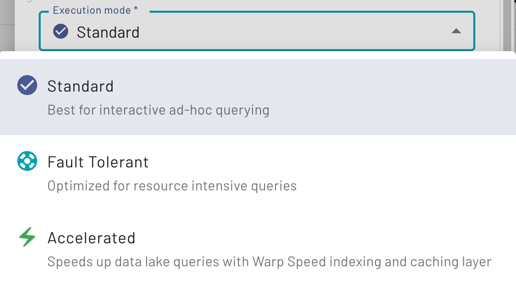Product:
Starburst Galaxy
- Overview
- Query data
- Explore data
- Data products
- Share data
-
Manage catalogs
- Overview
- Manage catalogs
- Object storage
-
Non-object storage
- Overview
- Amazon DynamoDB
- Amazon Redshift
- Amazon S3 Tables
- Apache Cassandra
- Apache Druid
- Apache Pinot
- Apache Polaris
- Azure Synapse
- ClickHouse
- Elasticsearch
- Galaxy Telemetry
- Google BigQuery
- Google Sheets
- Lakekeeper
- MariaDB
- Microsoft SQL Server
- MongoDB
- MySQL
- OpenSearch
- Oracle
- PostgreSQL
- Salesforce
- Salesforce Data Cloud
- SAP HANA
- Snowflake
- Unity
- Sample data sets
- Query performance
- Query routing
- Data ingest
- Migrating queries
- Overview
- Manage Galaxy access
- Manage data access
-
Manage cluster connectivity
- Overview
- SSH tunnels
- Galaxy IP allow list
- Amazon AWS
- Microsoft Azure
- Google Cloud
-
Private connections
- Overview
- AWS PrivateLink
- AWS PrivateLink for RDS (preferred)
- AWS PrivateLink for RDS (legacy)
- AWS PrivateLink for Snowflake
- AWS PrivateLink for MongoDB Atlas
- AWS PrivateLink for on-prem data source
- Connect clients to AWS PrivateLink
- Azure Private Link
- Azure Private Link for ADLS
- Azure Private Link for Azure database PaaS
- Azure Private Link for a database running a VM
starburst galaxy > data engineering > optimization performance and quality > workload optimization > Clusters with fault tolerant execution
Clusters with fault tolerant execution #
Fault-tolerant execution (FTE) allows a cluster to retry queries or parts of query processing in the event of failures without having to start the whole query from the beginning.
In fault-tolerant execution mode, intermediate exchange data is spooled and can be re-used by another worker. When queries require more memory than currently available in the cluster, they are still able to succeed. Multiple queries are able to share resources in a fair way, and make steady progress.
Do not use fault-tolerant execution if most queries in the cluster are short-running, typically less than one minute for completion, and require smaller amounts of memory. Query processing in fault-tolerant execution mode can be slightly slower than normal operation.
In Starburst Galaxy, specify fault-tolerant execution mode when creating or editing a cluster by selecting Fault tolerant in the Execution mode drop-down menu. No other configuration is required.

To take a cluster back to standard processing, select Standard from the same menu and restart the cluster.
Standard execution is a general purpose, ad-hoc analytics mode for queries that require a few minutes to run.
Accelerated execution enables Starburst Warp Speed’s smart indexing and caching to improve query performance. For more information, see Starburst Warp Speed.
Fault-tolerant execution is not designed to recover from broken queries or incorrect SQL.
Free cluster size. Not all
catalogs support FTE; when a cluster is FTE-enabled, this enables all of the
cluster’s catalogs that support FTE.Is the information on this page helpful?
Yes
No